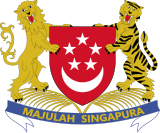
Back حكومة سنغافورة Arabic Gobyerno kan Singapur BCL Pemerintah Singapura ID 싱가포르 정부 Korean Pemerintah Singapura Malay Government of Singapore SIMPLE சிங்கப்பூர் அரசு Tamil Chính phủ Singapore Vietnamese 新加坡政府 Chinese Sin-ka-pho Chèng-hú ZH-MIN-NAN
| Government of Singapore | |
|---|---|
| Overview | |
| Established | 9 August 1965 |
| State | Republic of Singapore |
| Leader | Prime Minister of Singapore |
| Appointed by | President of Singapore |
| Main organ | Cabinet of Singapore |
| Ministries | 16 |
| Responsible to | Parliament of Singapore |
| Website | www |
| This article is part of a series on |
 |
|---|
|
|
| Government of Singapore | |||||||
|---|---|---|---|---|---|---|---|
| Chinese name | |||||||
| Chinese | 新加坡政府 | ||||||
| |||||||
| Malay name | |||||||
| Malay | Pemerintah Singapura | ||||||
| Tamil name | |||||||
| Tamil | சிங்கப்பூர் அரசு, Ciṅkappūr Aracu | ||||||
The government of Singapore is defined by the Constitution of the Republic of Singapore to consist of the President and the Executive. Executive authority of Singapore is vested in the President but exercised on the advice of the Cabinet led by the Prime Minister. The President, acting as the Head of State, may only act in their discretion in appointing the Prime Minister, acting as the Head of Government; as well as withholding consent for the dissolution of Parliament; along with performing key checks on the Government in addition to the ceremonial duties of the Head of State inherited from the Westminster system. The Cabinet, consisting of the Prime Minister and ministers appointed by the President on the Prime Minister's advice, is responsible for heading the Executive through ministries and other statutory boards. At the end of the term or at any time during the term, once the President has consented to a request made by the Prime Minister to dissolve Parliament, Parliamentary General Elections are held to elect members of Parliament for a new term. The President, in their discretion, then appoints a Prime Minister who is a member of Parliament representing any political party or coalition of political parties who in their judgement is likely to command the confidence of the majority of the members of Parliament. The Prime Minister then forms the Government and, along with the Cabinet, sets the general direction and control of the Government for the next term.
A statutory board is an autonomous agency of the Government that is established by an Act of Parliament and overseen by a government ministry. Unlike ministries and government departments that are subdivisions of ministries, statutory boards are not staffed by civil servants and have greater independence and flexibility in their operations. There are five Community Development Councils (CDCs) appointed by the board of management of the People's Association (PA) for districts in Singapore. Where there are not less than 150,000 residents in a district, the PA's board of management may designate the chairman of a CDC to be the mayor for the district that the CDC is appointed for. As it is the practice for Members of Parliament (MPs) to be appointed as Chairmen of CDCs, these MPs have also been designated as mayors. There are currently five districts in the country.
From the founding of contemporary Singapore in 1819, Singapore was headed by two residents in succession. Following Singapore's amalgamation into the Straits Settlements in 1826, it was governed by a governor together with a legislative council. An executive council of the Straits Settlements was introduced in 1877 to advise the governor but wielded no executive power. In 1955, a Council of Ministers was created, appointed by the governor on the recommendation of the leader of the house. Constitutional talks between Legislative Assembly representatives and the Colonial Office were held from 1956 to 1958, and Singapore achieved full internal self-government in 1959. The governor was replaced by the Yang di-Pertuan Negara, who had power to appoint to the post of prime minister the person most likely to command the authority of the assembly, and other ministers of the Cabinet on the prime minister's advice. In the 1959 general elections, the People's Action Party (PAP) swept to power with 43 out of the 51 seats in the assembly, and Lee Kuan Yew became the first prime minister of Singapore. The executive branch of the Singapore Government remained unchanged following Singapore's merger with Malaysia in 1963, and subsequent independence in 1965. The PAP has been returned to power in every general election and has thus formed the Cabinet since 1959.